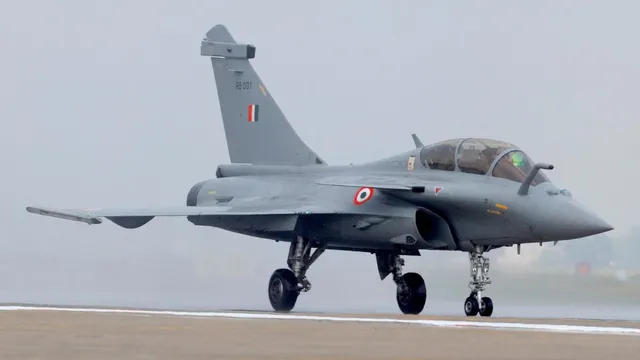- By Shivangi Sharma
- Wed, 19 Nov 2025 03:33 PM (IST)
- Source:JND
A US Congressional commission has revealed a large-scale disinformation campaign by China targeting India’s Rafale fighter jets during last year’s Operation Sindoor, according to a report released on Wednesday. The US-China Economic and Security Review Commission said Beijing employed fake social media accounts and AI-generated images to manipulate narratives about the aftermath of India-Pakistan military actions.
The report claims that China circulated doctored visuals purporting to show debris from Indian and French aircraft allegedly destroyed by Chinese weapon systems. These images were strategically spread to undermine confidence in the Rafale jets, operated by the Indian Air Force, while promoting China’s next-generation J-35 fighter aircraft in global arms markets.
“China initiated a disinformation campaign to hinder sales of French Rafale aircraft in favour of its own J-35s, using fake social media accounts to propagate AI images of supposed ‘debris’ from the planes that China’s weaponry destroyed,” the report stated.
It also highlighted that China opportunistically leveraged the India-Pakistan conflict in May to showcase the sophistication of its weapons, aiming to bolster its defense industry goals and international credibility.
Operation Sindoor: India’s Retaliatory Strikes
India launched Operation Sindoor in May as retaliation for the Pahalgam terror attack in April that claimed 26 civilian lives. The operation targeted terror infrastructure and military assets inside Pakistan. In August, Air Chief Marshal AP Singh confirmed that the Indian Air Force destroyed five Pakistani fighter jets and a large airborne surveillance aircraft, enhancing India’s military stature while challenging Pakistan’s narrative on the global stage.
India-China Relations: Strategic Asymmetry
The Commission also addressed India-China ties, highlighting an “asymmetry” in resolving border disputes. Recent reports indicate India increasingly perceives China as a serious threat along its northern borders, while bilateral economic and border-resolution agreements remain largely conceptual, with few specifics or follow-ups.
The report warned that the succession of the Dalai Lama could become a contentious issue between the two nations. It also questioned whether India’s 2025 commitments toward China reflect a short-term hedge in trade relations with the US or a genuine step toward long-term normalisation in bilateral relations.

